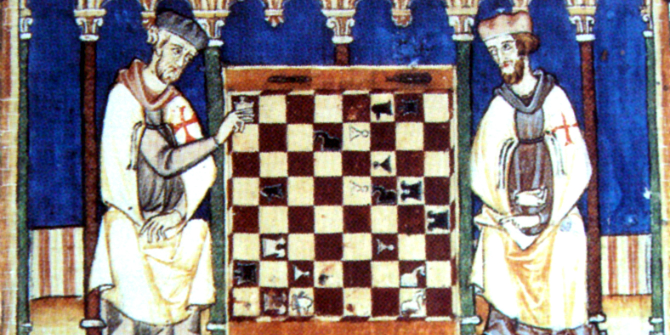 Cristian Nitoiu argues that leaving the EU might rekindle the UK’s role in shaping the foreign policy of Central and Eastern Europe, providing London decides to take a more active role in the international arena, specifically in key policy areas relevant in the region. He also notes that the region’s political leaders may turn to Atlanticism and play Germany and the UK against each in order to gain better leverage in shaping EU foreign policy.
Cristian Nitoiu argues that leaving the EU might rekindle the UK’s role in shaping the foreign policy of Central and Eastern Europe, providing London decides to take a more active role in the international arena, specifically in key policy areas relevant in the region. He also notes that the region’s political leaders may turn to Atlanticism and play Germany and the UK against each in order to gain better leverage in shaping EU foreign policy.
Before the accession of the post-communist countries of Central and Eastern Europe (CEE) to the EU, Britain had a relatively active foreign policy and enjoyed a high measure of prestige in the region. The UK hosted there large embassies and cultural institutes which allowed it to influence the domestic and foreign policies of the these countries. These efforts focused primarily on promoting an agenda of state democratization and modernization. Moreover, leaders from these states often looked to the UK for guidance and leadership in formulating their foreign policy.
EU membership of the post-communist states has had a limiting effect on the UK’s presence as a foreign policy actor in the region. This was partly caused by the gradual loss in expertise in the Foreign Office on the region, which was not seen any more as one of strategic importance for the UK. Integration with the EU seemed to have solved, at least on paper, critical issues relating to democracy building, which made the UK’s previous rationale for engaging in the region somewhat redundant. On the other hand, during the last decade, Germany and France have assumed more willingly the leadership of EU foreign policy. For the Central and Eastern European member states this meant that the UK became gradually less relevant. They now look more and more to Berlin for guidance and cues on foreign policy. Hence, EU membership has made the UK’s prestige and influence on the foreign policies of these member states virtually irrelevant in comparison to the 90s and early 2000s.
While a Brexit may not have very positive effects on the UK’s ability to shape EU foreign policy as whole, it could provide increased visibility in Central and Eastern Europe and a better position to influence the foreign policies of the countries in the region. It would make the UK’s foreign policy easier to distinguish from that of France and Germany and provide the CEE member states a much clearer alternative to what Berlin and Paris have to offer. Moreover, these countries might also try to advocate for the UK to assume a more active position on a series of key issues on the international agenda. This would potentially allow CEE leaders to play Germany and the UK against each in order to gain better leverage in shaping EU foreign policy.
 Nevertheless, this scenario is highly dependent on whether the UK would choose to assume a more distinguishable and active role on three issues which are key priorities for the CEE member states’ foreign policy.
Nevertheless, this scenario is highly dependent on whether the UK would choose to assume a more distinguishable and active role on three issues which are key priorities for the CEE member states’ foreign policy.
Firstly, stronger relations with the US post Brexit would probably translate in increased visibility for the UK in Central and Eastern Europe. The CEE states are in various degrees extremely supportive of strong transatlantic relations. If Brexit would mean that the UK turns even more to its ally across the ocean and even acts as its proxy, the CEE member states might seek Britain’s leadership in the hope of securing stronger transatlantic partnerships. Moreover, they might be even more committed to support a greater role for NATO and increase their defence budgets.
Secondly, the UK’s approach towards Russia will most likely be followed closely by the CEE member states. A more hawkish policy towards Russia (similar to that of the US) is likely to be supported and praised by most of the CEE states, many of them having at best problematic relations with Moscow. During the Ukraine crisis Britain indeed had a more conflictual approach towards Russia than Germany, however, it also avoided engaging in clear actions that would antagonize Moscow and would escalate the crisis (not taking into account the sanctions imposed by the EU).
Thirdly, most of the CEE member states have been interested to various degrees in helping the eastern neighbours of the EU develop and ‘escape’ from Russia’s sphere of influence. Within the EU, the UK has not particularly been at the forefront of supporting the eastern neighbours’ efforts to democratize. Nevertheless, in the event of Britain exiting the EU, the CEE member states might advocate for Britain to be more active in the eastern neighbourhood on its own terms, and possibly provide enhanced support for the countries in the region.
Providing a Brexit goes ahead Britain might have a chance to shape the foreign policies of the CEE member states in a more substantive manner. This will happen, of course, if the UK chooses to step up to the plate and have a more active approach to the key international issues of interest for the CEE member states.
The article gives the views of the author, and not the position of the LSE BrexitVote blog, nor of the London School of Economics and Political Science. Copyright *nisis* and licensed for reuse under this Creative Commons Licence.
Shortened URL for this post: http://wp.me/p6zUkq-7C
About the author:
 Dr Cristian Nitoiu is a Postdoctoral Fellow in EU-Russia relations at LSE IDEAS, a fellow of the Dahrendorf Project by the Hertie School of Governance, LSE and Stiftung Mercator. He held research positions at Trinity College Dublin and the College of Europe (Natolin campus, ENP Chair). His book on ‘EU Foreign Policy Analysis: Democratic Legitimacy, Media, and Climate Change’ will be published in June by Palgrave. He is currently working on a book on EU-Russia relations during Putin’s term, and another on change and continuity in Romania’s foreign policy since the country’s accession to the EU.
Dr Cristian Nitoiu is a Postdoctoral Fellow in EU-Russia relations at LSE IDEAS, a fellow of the Dahrendorf Project by the Hertie School of Governance, LSE and Stiftung Mercator. He held research positions at Trinity College Dublin and the College of Europe (Natolin campus, ENP Chair). His book on ‘EU Foreign Policy Analysis: Democratic Legitimacy, Media, and Climate Change’ will be published in June by Palgrave. He is currently working on a book on EU-Russia relations during Putin’s term, and another on change and continuity in Romania’s foreign policy since the country’s accession to the EU.






